How is the life of a social activist turned organic farmer
A social activist comes from a background strongly dedicated to addressing societal issues and promoting positive change. One would expect this commitment to not fade away when transitioning to organic farming; instead, to take a new form. Traits of the activist would translate into farming by advocating for sustainable farming practices, promoting local and organic food systems, and educating others about the importance of healthy, environmentally friendly choices.
A social activist turned organic farmer is expected to continue to engage with their local community, fostering connections and building relationships. They may sell their organic produce directly to consumers through farmers’ markets, community-supported agriculture (CSA) programs, or local food cooperatives. By doing so, they support the local economy, provide access to nutritious food, and create opportunities for dialogue about sustainable farming practices.
During my all-India cycle tour, I had the incredible fortune of crossing paths with Vasudha Sardar, a remarkable individual who has seamlessly transitioned from being a social activist to an organic farmer in the tranquil village of Pargaon in Pune district, Maharashtra. Despite being 71 years young, Vasudha ma’am exuded an invigorating energy that rivaled that of a spirited 17-year-old. It quickly became evident that she carried with her a rich heritage of social work, a profound sense of belonging derived from community service, and an undeniable expertise in farming, which had earned her the prestigious Sendriya Krishi Bhushan award. Conversing with her left me utterly awe-inspired.
The depth of Vasudha Sardar ma’am’s personality and the profound impact she and her entire family have had through generations of dedicated service to their community is simply indescribable. No matter how much time I spent listening to her captivating words, it seemed inadequate in capturing the essence of her being. My interaction with Vasudha Sardar taught me invaluable lessons on various aspects of life.
Through this narrative, I endeavor to provide a glimpse into Vasudha Sardar’s extraordinary life and the mindset that has shaped her into the remarkable person she is today.
Table of Contents
ToggleThe Heritage: Aba and her upbringing
Vasudha ma’am held her father, Raghunath Gopal Karmakar, in the highest regard, affectionately referring to him as Aba. Born in 1916, Aba pursued a legal education, as his father aspired for him to become a successful advocate. However, he soon realized that the legal profession often demanded bending the truth, an act he found morally challenging. Determined to base his work on honesty, he sought a profession where he wouldn’t have to compromise his integrity. That’s when he turned to agriculture, recognizing it as a profession that aligned with his values.
Starting from humble beginnings, Aba embarked on his agricultural journey and eventually became one of the key drivers of the green revolution in Maharashtra. He leased land in Mumbai and transformed it from a modest enterprise to a significant operation, even managing a herd of 400 buffalos at one point. While his friends suggested adulterating the milk with water, asking who would know, Aba firmly believed that he would know, and he abstained from such practices.
In 1962, Aba purchased land in Pargaon village due to its proximity to the Bhima river. This allowed him to maintain dry stock buffalos that did not produce milk in Pargaon, while keeping livestock in Mumbai. However, a government bill was passed, prohibiting animal rearing in Mumbai. Undeterred, Aba made the decision to shift his entire business to Pargaon in 1980, closing down his dairy operation in Mumbai.
Apart from his agricultural pursuits, Aba had a keen interest in social work. Recognizing that institutions in villages were often influenced by the whims and biases of the wealthy and upper castes, he sought to rectify the dishonesty prevalent in organizations such as milk cooperative societies and water supply systems. Aba started protesting against such practices, aiming to eradicate this unfairness. Eventually, in 1985, he founded the NGO organization Nav Nirman Nyas, dedicated to this noble cause.
Vasudha Sardar ma’am had the privilege of growing up closely observing and working alongside her father. She witnessed his unwavering dedication and commitment to both agriculture and social work. Inspired by his principles and values, she continues to carry forward his legacy, working tirelessly within the organization he founded.
The Nurture
Learnings from mother and father
Vasudha ma’am’s upbringing was shaped not only by her father, Aba, but also by the invaluable influence of her mother. Both her parents played significant roles in her development and instilled important values and lessons in her.
From her father, Aba, Vasudha ma’am imbibed a profound philosophy of questioning and challenging corruption. Aba believed that if he became a part of something corrupt, how could he bring about change within it? This belief left a deep impression on Vasudha ma’am’s mind and guided her own actions and principles. Aba actively encouraged Vasudha and her sibling brother to engage in various activities, such as working on the fields and reading editorials in newspapers. Through these experiences, Vasudha ma’am was exposed to the complexities of social and political issues at an early age.
One notable aspect that Vasudha ma’am observed was the ruling party at the time, the Shiv Sena. Initially, she believed that the party’s focus on Marathi interests was positive. However, through reading editorials, she realized that conflicts between national and state interests required considering the greater national perspective. This exposure to differing viewpoints broadened her understanding of societal dynamics and helped shape her own approach to social activism.
Vasudha ma’am also learned important lessons from her mother, who may not have had the same level of formal education as her father but played an equally significant role in her upbringing. Aba made sure that his wife accompanied him to socialist meetings, allowing Vasudha ma’am to witness the power of active participation and social engagement. From her mother, Vasudha ma’am learned the value of serving others and observed firsthand her mother’s loving care for her in-laws. Her mother’s actions demonstrated the importance of selfless assistance and compassion. This teaching became evident in Vasudha ma’am’s own actions and was particularly noticeable in her interactions with her husband’s family.
Learnings from father-in-law and husband
Vasudha Sardar’s learnings extended beyond her immediate family, encompassing her father-in-law and her husband, Ajit Sardar, who both played significant roles in shaping her understanding of social activism and governance.
Vasudha ma’am’s father-in-law, a renowned professor at SNDT University, had a profound impact on social movements in Maharashtra. Although he wasn’t directly involved in any organizations, his wisdom and expertise made him sought after by various groups for advice. Being in Mumbai, the central hub of many movements, he had an influence on numerous social causes. From him, Vasudha ma’am gained insights into the intricacies of social movements, the trends in the history of Maharashtra, and the complexities of political and social dynamics.
Her husband, Ajit Sardar, was a full-time social worker, dedicating himself to various causes. When they married in 1976, they both decided to contribute to social activities together. Ajit was involved with Yuvak Kranti Dal, a political organization that aimed to go beyond politics and sensitize people. Although the organization eventually faced division and dissolution, Vasudha ma’am had the opportunity to learn the nuances of strategic thinking, including Marxist psychology, through her husband’s work. She learned how to engage with the government, whom to approach, and how to effectively communicate her ideas and concerns.
Combining the teachings and experiences from her father-in-law, husband, and her own father, Vasudha ma’am gained a comprehensive understanding of social trends, historical context, political dynamics, and effective advocacy. These valuable lessons enabled her to navigate the complex landscape of social activism, shape her approach to creating change, and develop a strategic mindset in addressing societal issues.
The Nature
Ability to learn
Vasudha ma’am possessed a unique set of personal traits that contributed to her journey as a social activist and organic farmer. These qualities complemented the influence of her family and shaped her approach to creating positive change.
One of Vasudha ma’am’s notable traits was her ability to quickly grasp and absorb knowledge. She had a natural aptitude for learning and readily absorbed the teachings and wisdom imparted by her family. Whether it was the principles instilled by her father, the insights shared by her father-in-law, or the experiences and guidance of her husband, Vasudha ma’am demonstrated a keen ability to assimilate information and apply it to her own life and work.
Moreover, Vasudha ma’am showcased adaptability as a core trait. She recognized the importance of choosing the path that best aligned with her family’s well-being and the causes she believed in. This flexibility allowed her to navigate different roles and situations, adapting her approach to suit the needs of her family and the challenges she encountered along her journey.
Another remarkable quality exhibited by Vasudha ma’am was her ability to aptly cite stories and quotes from various individuals. She possessed a wealth of anecdotes and quotations that she could draw upon to convey powerful messages and insights. These stories and quotes served as compelling illustrations and emphasized the importance of context and understanding in addressing social issues.
Throughout her work, Vasudha ma’am shared valuable insights encapsulated in quotes that reflected her philosophy and approach. For instance, she emphasized the significance of transformation as the ultimate goal of running an NGO, recognizing that true change requires more than just charity or development. She also emphasized the importance of having a wider perspective, understanding that although the operational scope of a company may be limited, the perspective must encompass a broader understanding of societal needs.
Furthermore, Vasudha ma’am acknowledged the need for both compulsion and persuasion in running a family or a nation. She recognized the delicate balance between authority and influence, understanding that a combination of these elements was essential for effective governance and family management.
Never complained about her Ill health
Vasudha ma’am faced a challenge with her hearing that affected her confidence. She had to undergo 3 operations to get it decently set right. Eventually, she discovered that she had a congenital defect resulting in only one developed kidney and a non-functional ovary, preventing her from bearing a child. This was a lifelong concern for her, but she mentioned that she has now moved past it. Despite her inability to become a mother, she expressed a longing for that aspect of her life, often observing the children of her staff while growing up, which awakened her maternal instincts. When asked about her ability to remain happy despite these difficulties, she revealed that she consciously separated her happiness from her health issues, considering them as separate aspects of her life.
The Outcome
In the 1970s, Aba displayed a strong commitment to the empowerment of women. He firmly believed in the principles of equality, fraternity, and social justice, and sought to ensure that women could actively experience these values in society. Recognizing her passion and potential, Vasudha ma’am was actively involved in these efforts.
One significant cause she championed during that period was the movement against alcohol consumption among the youth. As women began expressing their grievances about their husbands’ excessive drinking habits, Vasudha ma’am wholeheartedly dedicated herself to the anti-liquor movement. Her involvement aimed to address the adverse effects of alcohol on individuals and families.
Simultaneously, Vasudha ma’am also actively worked towards promoting gender equality and combating caste discrimination. These issues were close to her heart, and she undertook meaningful initiatives to challenge societal norms and fight for a more inclusive and just society.
Mahila Sangh
In 1975, Vasudha Ma’am initiated a significant mahila (women’s) movement in Pune, India. The organization she was part of was dedicated to organizing domestic workers, aiming to explore the concept of sisterhood between housewives and their woman servants. However, she soon realized that class interests often overshadowed the notion of sisterhood.
Recognizing the profound influence of the caste system on society, Vasudha Ma’am understood the importance of de-casting oneself. She believed in raising awareness about the caste system among women, particularly those from different social backgrounds. To achieve this, she took it upon herself to teach and educate them about the discriminatory practices deeply rooted in the society’s fabric.
Vasudha Ma’am emphasized that one’s social origin is not within their control. However, she encouraged individuals to consciously make efforts to develop humanity and rise above the confines of caste divisions. By promoting unity and compassion, she aimed to break down the barriers created by caste and foster a sense of equality among women.
Anti alcoholic movement
Vasudha Ma’am spearheaded an impactful anti-liquor movement in Pimpalgaon, Maharashtra. Her efforts resulted in the closure of a beer bar in the village, with the support of numerous village women. Their dedication was evident as they went on a hunger strike for a remarkable period of eight days, making a strong statement against alcohol consumption.
During the strike, the protest took place outside the Excise office, drawing attention to the cause. The movement invoked the constitutional clauses that allow the closure of bars based on two specific reasons: technical issues and broader public concerns. Utilizing this legal framework, Vasudha Ma’am and her supporters gathered the support of over 25% of the village’s population to request the bar’s closure.
As a result of their persistent efforts, the bar’s license was ultimately canceled, leading to its permanent shutdown. Since 1985, both Pimpalgaon and Pargoan, where Vasudha Ma’am resides, have been free from any bars or establishments serving alcoholic beverages or tobacco related products.
Organic farming
Vasudha ma’am’s journey into organic farming began after experiencing the loss of three loved ones to cancer: her mother, sister-in-law, and husband. After Aba’s demise, she observed the declining quality of soil on their farms, a result of the Green Revolution’s practices. Determined to make a change, she delved into the world of organic farming.
During her husband’s final stages, Vasudha ma’am fed him raw vegetables, which conflicted with the doctor’s advice. This sparked her realization that there was a lot of misinformation surrounding food and health. From that point on, she dedicated her life to organic farming.
In 2011, Vasudha ma’am received the Sendria Krishi Bushan award from the Maharashtra government for her immense contribution to organic farming. She has become a prominent figure in the field and has a wealth of knowledge to share.
In 1965 the Green Revolution began, promoting the use of fertilizers. However, she realized the limitations of this technique, as warned by Dr. Swaminathan, the father of the Green Revolution. Chemical farming resulted in capital-intensive practices and ecosystem damage, leading to health and environmental issues.
In 2003, Vasudha ma’am attended a lecture by Subash Palekar, which opened her eyes to the problems associated with chemical farming. Mono-cropping and excessive mechanization were damaging the soil, causing increased salinity, dead microflora, and waterlogging. The balance of soil, moisture, and aeration was disrupted, negatively impacting crop yields and nutritional value.
Vasudha ma’am believes in the interconnectedness of everything in the universe and recognizes the vital role of vegetation in sustaining life. She emphasized the need to maintain the link between farming and the grand mechanism of the universe, acknowledging the negative impact humans have had on the environment.
Inspired by books such as “Silent Spring” (1962) and “Empty Harvest” (1992), Vasudha ma’am expanded her knowledge of the effects of modern farming practices on the world.
Today, Vasudha ma’am runs an organization called Sendriya Setu, which operates under the umbrella of Nava Nirman Nyas. The organization focuses on practicing and promoting organic farming, although they face challenges in making it economically viable for small farmers. Labor ownership and increased costs are ongoing issues.
Sendriya Setu encompasses a wide range of activities, including cultivating 100 acres of land for organic farming, growing sugarcane and wheat on 60 acres, and maintaining 30-40 labor quarters. The organization employs staff from various departments, including dairy, farming, and marketing.
Vasudha ma’am’s passion for educating the younger generation about organic farming is evident. Under her guidance, school children, particularly those in the sixth and seventh grades, participate in projects related to afforestation and kitchen gardens. They actively contribute and even give talks in schools, demonstrating their enthusiasm for organic farming.
The individual
Vasudha ma’am’s life has been anything but ordinary. With a rich heritage to uphold, she has dedicated herself to numerous social activities while always prioritizing her family and making significant sacrifices. However, it was the heartbreaking loss of loved ones that propelled her towards a new path—organic farming. Intrigued by her extraordinary journey, I couldn’t help but wonder what her life truly entailed. With a burning curiosity, I approached her and asked a series of questions to delve into the depths of her experiences.
Justification
When asked why she does what she does, Vasudha ma’am expresses a deep sense of pleasure and fulfillment in her work. She believes that her drive to contribute to society in a meaningful way is rooted in her upbringing. Despite receiving advice from her elder brother to stop working, she remains committed to her mission, as she believes it gives purpose to her existence.
For Vasudha ma’am, the sense of fulfillment she derives from her work is essential to her being. She recognizes that if she were to cease her efforts, her purpose would diminish. In her response, she fondly recalled her mother, and teared up as she shared her mother’s words of wisdom: “Help somebody with your right hand without any expectation, and there is no reason for your left hand to know about it.” This mantra resonates deeply with Vasudha ma’am, emphasizing the importance of selfless service and the intrinsic satisfaction it brings.
Validation
Vasudha ma’am explained that she seeks validations on a larger scale rather than in a personal sense. She believes in doing things for others without expecting recognition or acknowledgement. In her perspective, it is important to forget one’s own deeds and let go of the ego. The validation of the self should not be the driving force behind her actions.
To illustrate her point, she shared a poignant example. She compared seeking validation to a wife who prepares food for her family and asks them how the meal was. The intention behind her inquiry is not to receive praise for her cooking skills but to ensure that her family is healthy, happy, and well-nourished. Similarly, Vasudha ma’am focuses on the impact of her work on the larger community, rather than seeking personal validation.
Complaints
According to Vasudha ma’am, she has no personal complaints as she has had the fortune of encountering good people in various aspects of her life, including her parents, in-laws, husband, and colleagues. She expresses contentment with her personal relationships and holds no grievances in that regard.
However, Vasudha ma’am does acknowledge feeling outdated for society. She believes that the world is changing rapidly, and she struggles to keep up with these changes. She doesn’t necessarily complain about this situation but rather sees it as a circumstance that prevents her from accomplishing more.
In response to these sentiments, Vasudha ma’am offers some advice. She suggests that one should strive to understand and accept a given situation. If there are aspects that can be changed, one should work towards making those changes. But for the things that cannot be altered, it is important to embrace and adapt to them.
When it comes to her beliefs, Vasudha ma’am explains that she does not adhere to the conventional concept of God. Instead, she places her faith in humanity and refers to nature as her embodiment of divinity. She sees nature as a force that operates without any ulterior motive and asserts that no human organization can replicate even a fraction of its complexity and efficiency.
Furthermore, Vasudha ma’am encourages individuals to embody goodness themselves rather than relying on external forces. She advises against waiting for someone or something else to bring about positive change and emphasizes the importance of taking personal responsibility without any complaints. Rather than attributing responsibilities to a higher power, she suggests taking charge of one’s own actions and making a difference through personal efforts.
Materialsm
Vasudha ma’am stated that if she were to receive a large sum of money, her focus would not be on personal gain. Instead, she would prioritize either institutionally investing the funds or directing them towards infrastructure development. While she admitted that she hadn’t thoroughly thought about it, her aim would be to achieve sustainable, long-term results and ensure that the positive impact continues to grow over time.
I had the immense pleasure of engaging in a captivating conversation with Vasudha ma’am that extended over the course of a day and a half. Our discussion encompassed a wide array of topics, and I found myself enriched with knowledge and insights from her wisdom. As our dialogue drew to a close, I took the opportunity to inquire if she had a message that she wished to share with the world. With a thoughtful pause to choose her words carefully, Vasudha ma’am conveyed the following profound sentiment:
“Know yourself. Be true to yourself. Live authentically as yourself.” In her perspective, self-awareness is not limited to understanding one’s own being but also entails recognizing our connection to the universe. She emphasized the vital importance of embracing this interconnectivity, urging us to never overlook or sever the delicate chain that binds us together. With steadfast conviction, Vasudha ma’am encouraged us to preserve this interconnectedness, allowing it to exist in its natural state, unbroken and unaltered.
For more of such articles, head to the homepage and subscribe to my newsletters.
I am a 31 year young PhD graduate who has decided to travel the length and breadth of India on my cycle, to document the journey of meeting a vast array of people. In my journey, I intend to understand the characteristic features of the people of this nation and categorize them based on their demographics, age, profession, gender, traditions, and cultural differences.
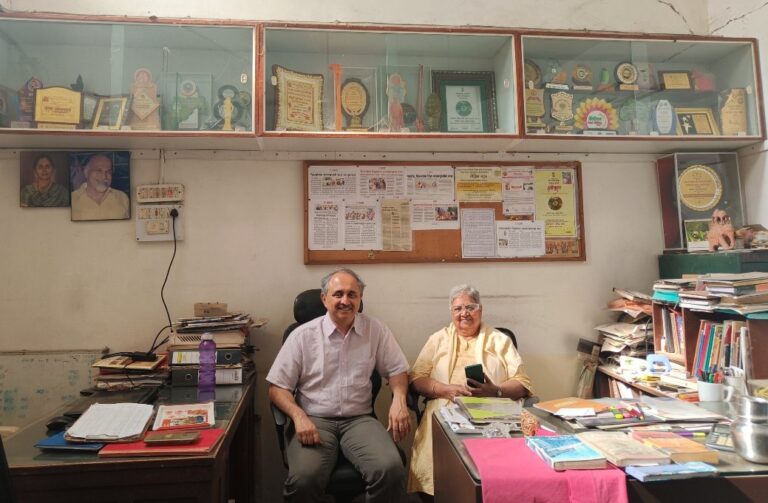
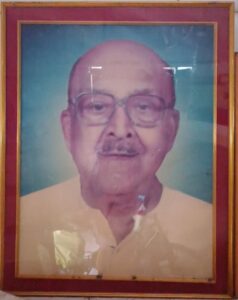
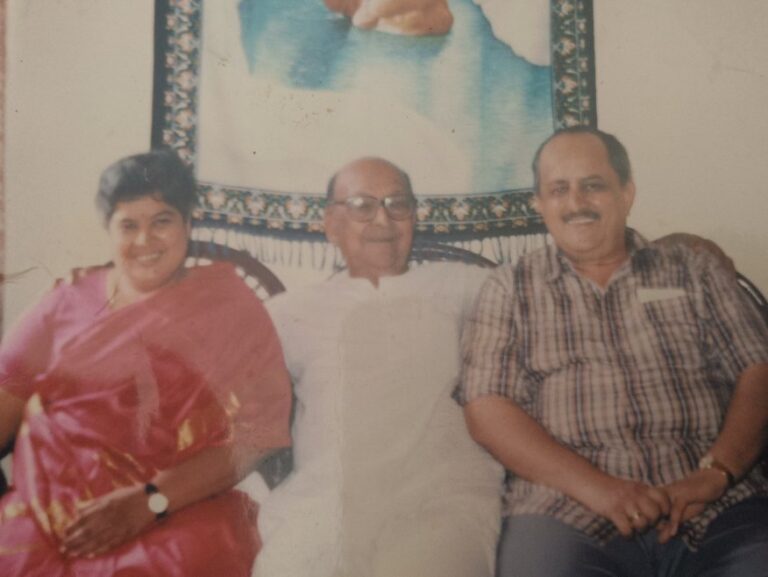
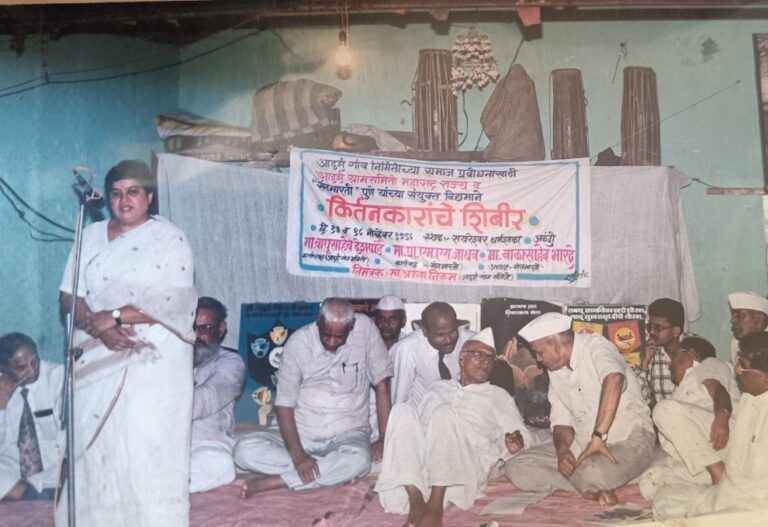
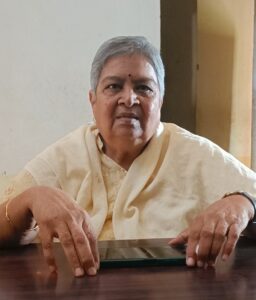
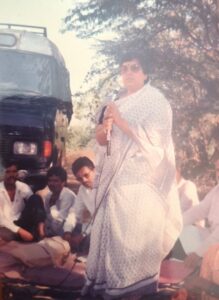
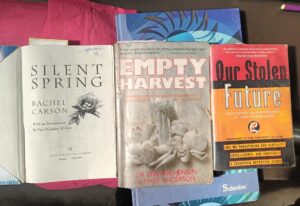
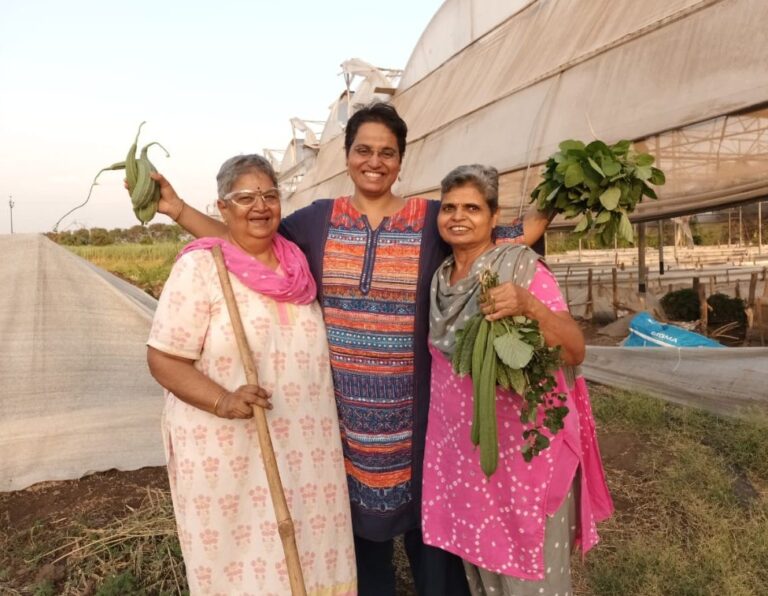
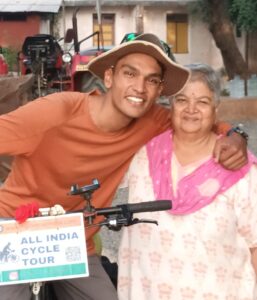
Truly inspiring personality…and a great article to read too. I must appreciate that your writing is getting awesome day by day.
Truly inspiring personality…and a great article to read too. I must appreciate that your writing is getting awesome day by day.